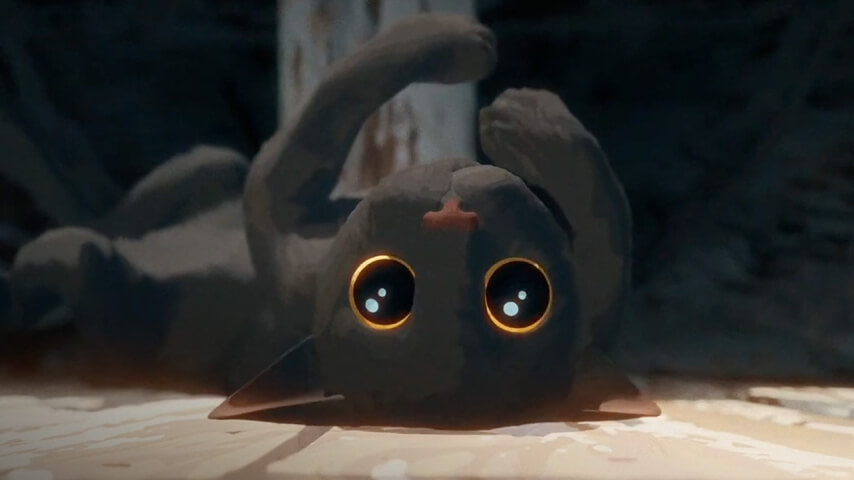Dialogue-free animation is currently mostly contained to artsy episodes of TV or emotionally devastating Pixar shorts. A sole reliance on visual storytelling has developed a mature reputation as popular kiddie fare has only gotten sillier and shoutier, more overrun with Minions and more reliant on YouTube’s autoplaying algorithm. But Gints Zilbalodis’ Flow, compared to the adult-oriented Robot Dreams’ Oscar-nominated look at NYC loneliness, competes more with something like the original Fantasia. The Latvian film is part brilliant experiment, part cutesy animal movie, but engrossing for all audiences—even if it might, like Fantasia, stick uncomfortably in the memories of the youngest in attendance.
Though, in synopsis, Flow seems like it has more in common with Homeward Bound than boundary-pushing European animation, its trip through a Genesis-like flood rides waves both hokey and awe-inspiring. When the rivers overrun a forested idyll, a normal day hunting, sunning, and sleeping becomes a desperate quest for survival. Its half-populated Noah’s Ark—a wooden sailboat crewed by our inquisitive black cat protagonist, a doltish Lab, a snoozy capybara, a hoarding lemur, and an intimidating secretarybird—floats along this watery nightmare like an arthouse version of Unlikely Animal Friends.
Though initially revolving around the attention to detail that takes center stage when creating a world of silent naturalism, the script from Zilbalodis and Matīss Kaža sometimes overpowers the incredible showcase of light, color, and movement with out-of-place cartoonishness.
There’s so much focus, for instance, on how a cat jumps, stretches, and paces, twirling around in just the right way to fold up into a little cinnamon bun. A herd of deer stampedes, just as terrifying as the wildebeest in The Lion King because of our kitten-high perspective. The cel-shaded aesthetic, creating light-catching layers of fur and feather, is far more lovely and useful for capturing recognizable animalisms than the uncanny photorealism pursued by, say, Disney’s “live-action” remakes. (That is, apart from the oddly lifeless main dog; Flow is clearly a movie for cat people.) And specifically with the globe-eyed feline at the center, sound designer Gurwal Coïc-Gallas finds just the right expressions in this wordless world. Every pleasurable purr and inquisitive trill drives the story while supplementing the curated verisimilitude of its painted seascape. Flow, like the best nature documentaries, compels through the illusory idea that, at any moment, one could peer in on animals and find them living out daily adventures.
So when those animals abandon this careful formal familiarity for sillier, narrative-driven actions (like competing over who will rudder their craft, or frowning at an annoying shipmate), Flow wants it both ways. The 85-minute movie sort of needs both modes, too, because neither is enough to sustain the feature on their own. It’s too slight to rely entirely on the breathtaking world, submerged and on the edge of apocalypse, yet too serious in subject matter and atmosphere for the species’ culture-clash comedy to be more than flourishes. But, even understanding their interdependent necessity doesn’t exactly make the film’s harder turns into mythological cataclysm jibe with the slapstick. Similarly, the cheesiest “dogs are dumb and friendly, cats are smart and standoffish” sequence never quite erases the quiet power of Flow’s absences.
Humanity once existed in Flow’s land. Boats and glass baubles live on, the latter partially because they provide mirroring surfaces that allow Zilbalodis to push the limits of his animation tech. There are empty temples and abandoned statues, homes where somebody used to live. It’s all mostly underwater now, consumed by their own shimmering reflections. As the animals’ vessel navigates these ruins, heading towards mysterious and seemingly natural stone spires towering on the horizon, the fate of those who built them is never contemplated. There’s an immediacy to Flow that energizes its mythmaking, that eschews overexplanation for imagination.
But what’s never left up for speculation is Flow’s intended message. Its come-together spirit and cyclical stance towards survival pushes a moral as simple and common as the flood-myth motif. The sentimentality runs as wild as the camera, resulting in moments that might make you wonder what kids are actually going to find—let alone make it through—this artsy story. But those that do will have found a challenging, exciting piece of animation that dreams as big as any richly illustrated storybook.
Director: Gints Zilbalodis
Writer: Gints Zilbalodis, Matīss Kaža
Release Date: November 22, 2024


 Keep scrolling for more great stories.
Keep scrolling for more great stories.